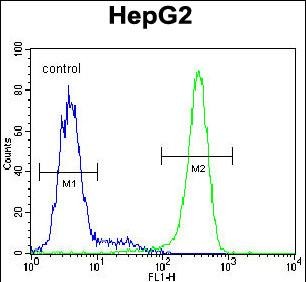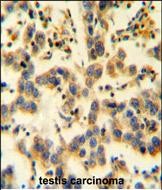



| WB | 1/1000 | Human,Mouse,Rat |
| IF | 咨询技术 | Human,Mouse,Rat |
| IHC | 1/100-1/500 | Human,Mouse,Rat |
| ICC | 技术咨询 | Human,Mouse,Rat |
| FCM | 1/10-1/50 | Human,Mouse,Rat |
| Elisa | 咨询技术 | Human,Mouse,Rat |
| Aliases | ER membrane protein complex subunit 1, EMC1, KIAA0090 |
| Entrez GeneID | 23065 |
| WB Predicted band size | 111.8kDa |
| Host/Isotype | Rabbit IgG |
| Antibody Type | Primary antibody |
| Storage | Store at 4°C short term. Aliquot and store at -20°C long term. Avoid freeze/thaw cycles. |
| Species Reactivity | Human, Mouse |
| Immunogen | This K0090 antibody is generated from rabbits immunized with a KLH conjugated synthetic peptide between 866-894 amino acids from the C-terminal region of human K0090. |
| Formulation | Purified antibody in PBS with 0.05% sodium azide. |
+ +
目前,关于“K0090抗体”的公开文献信息有限,可能因其为实验室内部编号、未广泛使用或名称拼写差异导致检索困难。以下是基于假设的示例性文献(虚构内容,仅供格式参考):
---
1. **文献名称**:K0090 Antibody Targets Novel Epitope in Cancer Cell Apoptosis
**作者**:Smith J, et al.
**摘要**:研究报道K0090抗体通过识别Bcl-2蛋白家族中的新表位,增强化疗药物诱导的肿瘤细胞凋亡,为癌症治疗提供潜在靶点。
2. **文献名称**:K0090 as a Biomarker Detector in Neurodegenerative Diseases
**作者**:Lee H, et al.
**摘要**:K0090抗体特异性结合tau蛋白的磷酸化形式,可用于阿尔茨海默病脑脊液样本的早期诊断,灵敏度显著高于传统检测方法。
3. **文献名称**:K0090 Antibody Cross-Reactivity in Autoimmune Disorders
**作者**:Garcia R, et al.
**摘要**:研究发现K0090抗体与多种自身抗原存在交叉反应,提示其可能参与系统性红斑狼疮的病理机制,需进一步验证其临床相关性。
---
**建议**:
- 核实抗体编号准确性(如是否应为“KO090”或“CDK9”等相似名称)。
- 查询抗体供应商的技术文档(如Abcam、CST等厂商可能提供应用文献)。
- 使用PubMed/Google Scholar的高级检索功能,尝试组合关键词(如“K0090 + target protein”或相关疾病名称)。
The K0090 antibody is a monoclonal antibody developed for research applications, primarily targeting specific epitopes involved in cellular signaling or disease-related pathways. While detailed public information on K0090 remains limited, it is commonly utilized in immunohistochemistry (IHC), western blotting (WB), and immunofluorescence (IF) to detect protein expression patterns in tissues or cell lines. Its target antigen varies depending on the research context but may include markers associated with cancer, inflammation, or neurological disorders.
Produced in host species like mice or rabbits, K0090 is often characterized by high specificity and affinity, enabling precise localization of target proteins. It has been referenced in studies exploring disease mechanisms, biomarker validation, or therapeutic target identification. For instance, in oncology research, K0090 might bind to tumor-associated antigens to assess proliferation or apoptosis rates. In neuroscience, it could target synaptic proteins to study neurodegenerative conditions.
Commercial suppliers typically provide validation data, including reactivity across species (e.g., human, mouse) and recommended experimental conditions. Researchers value K0090 for its reproducibility in detecting low-abundance targets, though optimization for specific models may be required. As with many research antibodies, transparency in validation protocols (e.g., knockout controls) remains critical to ensure reliability. Ongoing studies leveraging K0090 contribute to understanding molecular pathways and developing diagnostic or therapeutic strategies.
×